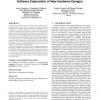Free Online Productivity Tools
i2Speak
i2Symbol
i2OCR
iTex2Img
iWeb2Print
iWeb2Shot
i2Type
iPdf2Split
iPdf2Merge
i2Bopomofo
i2Arabic
i2Style
i2Image
i2PDF
iLatex2Rtf
Sci2ools
159
Voted
CASES
2006
ACM
2006
ACM
Automatic performance model construction for the fast software exploration of new hardware designs
Developing an optimizing compiler for a newly proposed architecture is extremely difficult when there is only a simulator of the machine available. Designing such a compiler requires running many experiments in order to understand how different optimizations interact. Given that simulators are orders of magnitude slower than real processors, such experiments are highly restricted. This paper develops a technique to automatically build a performance model for predicting the impact of program transformations on any architecture, based on a limited number of automatically selected runs. As a result, the time for evaluating the impact of any compiler optimization in early design stages can be drastically reduced such that all selected potential compiler optimizations can be evaluated. This is achieved by first evaluating a small set of sample compiler optimizations on a prior set of benchmarks in order to train a model, followed by a very small number of evaluations, or probes, of the t...
Related Content
| Added | 13 Jun 2010 |
| Updated | 13 Jun 2010 |
| Type | Conference |
| Year | 2006 |
| Where | CASES |
| Authors | John Cavazos, Christophe Dubach, Felix V. Agakov, Edwin V. Bonilla, Michael F. P. O'Boyle, Grigori Fursin, Olivier Temam |
Comments (0)

